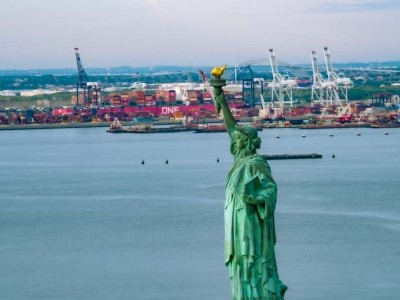Montreal longshoremen launch second strike against Termont’s container terminals
In a new pressure tactic in a series of partial work stoppages, the union representing 1,200 longshoremen at the Port of Montreal today began an “unlimited strike” uniquely targeting Termont, which operates two terminals accounting for 40% of container cargo at Canada’s second biggest container port after Vancouver. While all other terminals remain operational, the Port of Montreal expressed “its deep concern about the negative repercussions of this work stoppage.”
As was the case of a three-day work stoppage earlier this month, the job action will affect Termont’s Viau and Maisonneuve terminals that employ some 300 dockers notably handling substantial contractual business with Mediterranean Shipping Company.
This follows a 24-hour industrial action staged last Sunday by Local 375 of the CUPE union. There has also been an ongoing boycott of overtime work since October 10.

With substantial container handling capacity paralyzed by this work stoppage, ships and trains are already obliged to choose other routes, the Montreal Port Authority (MPA) stated.
Major impacts for port operations and the economy
“At present, the overtime strike launched two weeks ago has already caused a backlog of containers on site (including hundreds of refrigerated containers carrying containers of medical, pharmaceutical and food products), as well as a loss of productivity, leading to the cancellation of several outbound train convoys,” the MPA reported.
It continued: “The ongoing work stoppage at the Viau and Maisonneuve terminals is paralyzing 40% of total container handling capacity at a crucial time when goods, especially those for the holiday season, are currently expected at the Port of Montreal. Of the five container ships with a total combined capacity of 18,000 TEUs (20-foot equivalent units) heading to Montreal, including containers of critical goods (medical and pharmaceutical products), some have already turned back to other ports due to what is happening at this time. Of the 26 container ships scheduled to call at the Viau or Maisonneuve terminals over the next three weeks, it is likely that many other vessels could as well change their port of destination.”
Earlier this week, union spokesman Michel Murray took Termont to task for allegedly modifying schedules in a punitive way. He suggested that this was not the case of Montreal Gateway Terminals, the largest container operator at the port.

“Termont is provoking longshore workers and their local by using schedules that have negative impacts on work-life balance,” he declared, adding: “If we reach a permanent agreement on this issue, we could avoid a strike set to begin on Oct. 31. Let’s resolve the issues around work schedules, and then I am confident we can resolve the rest.”
The current collective agreement expired on December 31, 2023.
Responding to the latest development in the waterfront labor conflict, the Maritime Employers Association (MEA) said it deplored the new unlimited strike that has specifically paralyzed the two terminals operated by Termont as of 11:00 a.m. today.
“The MEA cannot grant the Union's demand to change work hours without formal negotiations. The schedules used on the different docks—shift and relay—called into question by the Union in recent days, are enshrined in the collective agreement in force and cannot be used as a bargaining chip for a strike targeting a single operator, as is the case today.”
Timing with downward market trend
The maritime employer group continued: “The MEA has been affected by a drop in volume at the Port of Montréal for several months already, forcing it to make some cuts within the organization. It continues to regularly review its situation. Difficult but necessary decisions may have to be made to cope with the many impacts of this new strike. According to Port of Montréal data, the market is already down 30% compared to 2022.”
The MEA reiterated its request “that the federal Minister of Labour intervene to bring the parties back to the negotiating table to put an end to this conflict that affects our clients, partners and their trust in the Port of Montréal.”
Labor Minister Steven MacKinnon recently proposed the appointment of a new, special moderator for the parties to resume negotiations without a lockout or strike for 90 days – but that offer was turned down by both parties.
Business reaction
Meanwhile, the Canadian Federation of Independent Business (CFIB), Canada’s largest association of small and medium-sized businesses, has strongly criticized the union’s pressure tactics and urged the federal government to intervene.
“The only reason the longshoremen are striking is because they can,” the CFIP bluntly stated. “They have no remorse for the economic harm and uncertainty their actions are causing. Canada's SMEs are once again the collateral damage of the union's irresponsible actions,” charged Jasmin Guenette, Vice-President, National Affairs.
He affirmed that “labor laws are so heavily weighted in favor of the big unions. It's time the federal government made ports an essential service, so that they remain operational at all times. This will protect our supply chain and our SMEs and will make labor actions like we are seeing at the Port of Montreal impossible.”
Similar Stories

Port of Seattle Statement on importance of industrial lands
View Article
Port of Los Angeles processed 10.3 million TEUs in 2024
View Article
Port Authority to outilne upcoming PATH Hoboken Station closure, detail alternate travel options
View Article
Georgia Ports welcomes Wallenius Wilhelmsen’s new Brunswick hub facility
View Article
Port of Los Angeles Executive Director Gene Seroka outlines successes, priorities at ‘State of Port Event’
View ArticlePort Houston surpasses $1B in awards to small, minority, and women-owned businesses
Port Houston is proud to announce a significant milestone in its commitment to equity and economic opportunity: More than $1.1 billion has been awarded in contracts with Small, Minority, and…
View ArticleGet the most up-to-date trending news!
SubscribeIndustry updates and weekly newsletter direct to your inbox!





